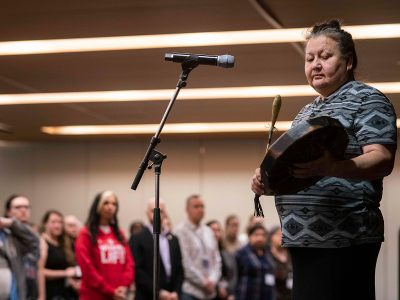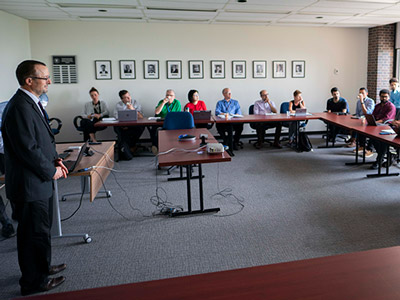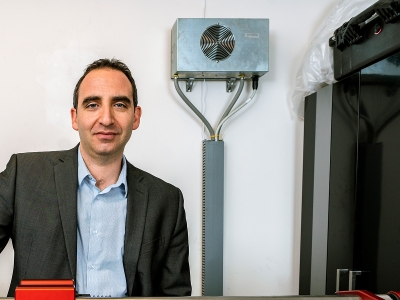By Joseph Mathieu
Photos by Justin Tang
In a time when even the most principled journalists are sometimes accused of vested interests, Carol Off wanted to make one thing very clear.
“To be in favour of human rights — of human dignity, the protection of children, the lives and welfare of people — is not to have a bias.”
On Sept. 25, 2018, the veteran reporter and longtime host of CBC Radio’s As It Happens delivered the 19th annual Kesterton Lecture. Her talk, titled Taking Sides: Journalists, Sources, and Crossing the Line, addressed working journalists, students and fans.
Created in honour of media law and journalism history expert, Wilfred Kesterton, who was integral in establishing the School of Journalism and Communication, the event celebrates journalism education in Canada.
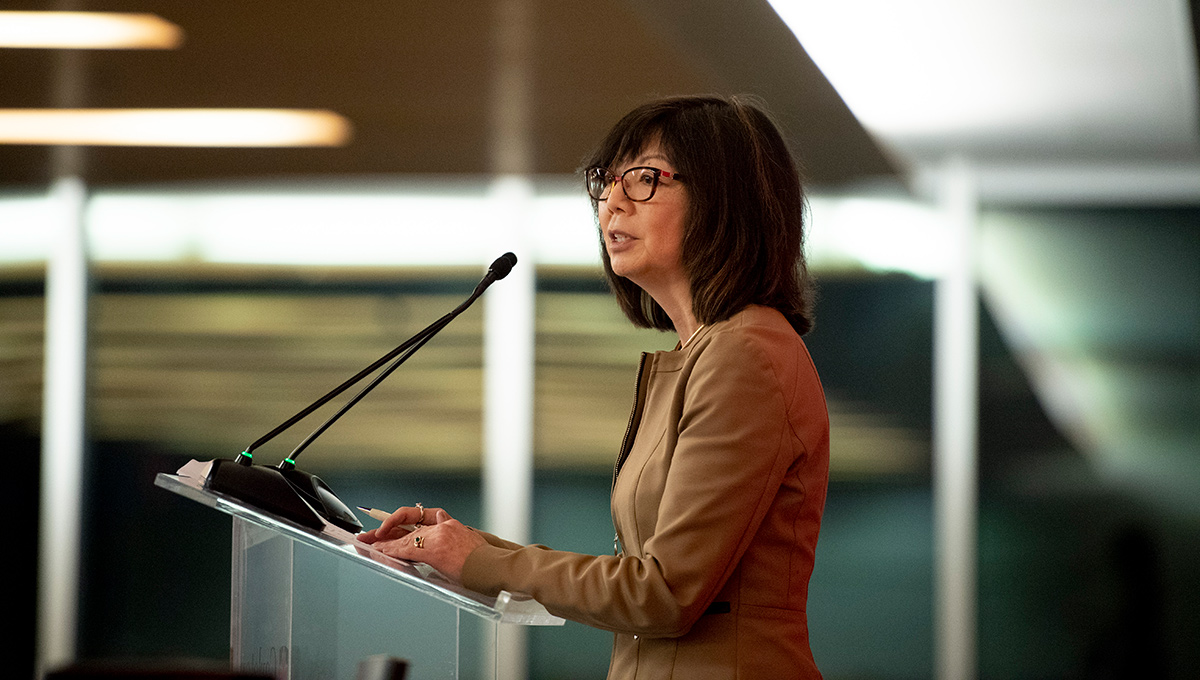
Prof. Susan Harada, associate director of the School of Journalism and Communication, introduces Carol Off.
Off examined the complexities of journalistic ethics surrounding sources. Her coverage of conflict all over the world — in Europe, Asia, the Middle East and North America — regularly forced her to make difficult decisions.
In Macedonia, during the Kosovo War, Off and her team interviewed some of the tens of thousands of Albanians fleeing massacre.
“Various governments, including Canada’s, are debating whether or not to intervene in Kosovo, to send troops,” she said, putting her rapt audience in the moment.
“But they’re not really sure what’s going on. Inside Kosovo, we have documented ethnic cleansing. This reporting could tip the balance.”
They gave the refugees food and water they could spare, but the Albanians wanted to use their cell phones to find their loved ones.
“They have life and death issues,” she said. “We need our battery power for our stories. What’s the priority?”
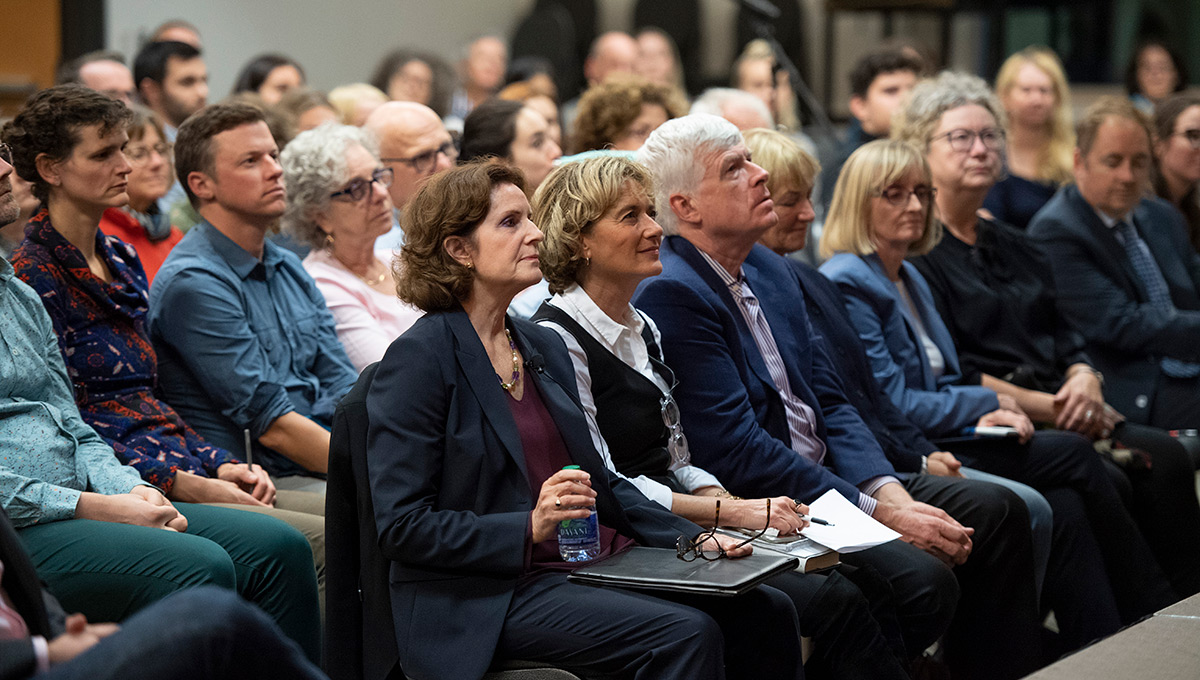
When Does Humanity Supersede Journalism?
Her lecture was peppered with questions that chipped away at the issue: How far do you go to protect a source? When do you put down the camera and the notebook? When does humanity supersede journalism?
Throughout her career exposing unethical practices and covering atrocities, Off wanted to intervene multiple times. However, except in moments when she could be helpful without interfering in the story, she stay focused on the task at hand.
Her entire perspective changed in 2008, when she ran into an old source in Islamabad. Asad Aryubwal, an Afghan wholesale business owner who had been the backbone of her 2002 CBC documentary about the country’s violent warlords. He exposed the ruthlessness of Uzbek warlord Abdul Rashid Dostum, knowing full well the danger of his disclosure.
“He told me that if he had not spoken out against the warlord, against injustice, he would never be able to look into the eyes of his children again,” she said.
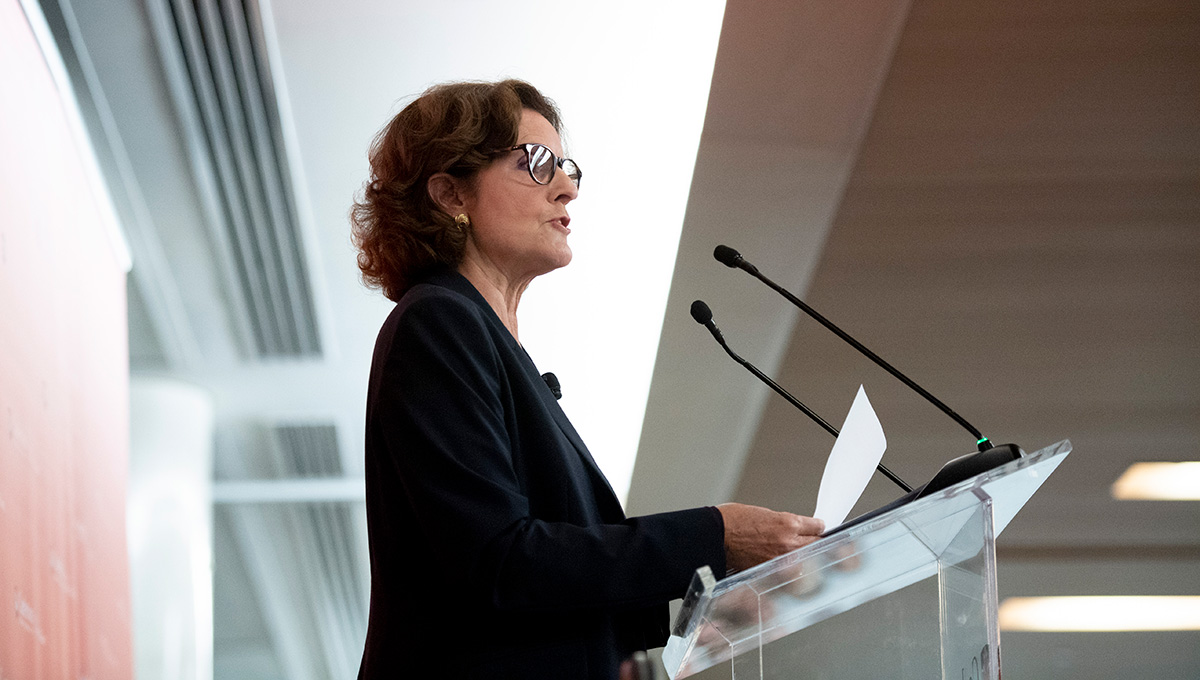
Aryubwal, his wife, and five children were threatened with violence after the documentary aired. Years later, Off followed up with him as a source to report that the warlords still terrorized the region. The second documentary aired and the Aryubwals were given two options: leave or die.
“Almost by chance, I found Asad living in exile in Pakistan,” said Off.
“His life was in ruins, he was impoverished, fearing for his life. His family had no future.
“I decided at that moment that I was going to get him out of the mess I had put him in.”
In a question and answer session moderated by CTV Ottawa Bureau Joyce Napier, Off said the situation was a unique experience.
- Reinventing Communication and Media Studies
- Carleton Journalism Student Wins TVO’s Inaugural Short Short Doc Award
- Media Forensics Lecture Kicks Off 40th Anniversary of Communication and Media Studies
For her 2006 book Bitter Chocolate: Investigating the Dark Side of the World’s Most Seductive Sweet, she exposed exploitative cocoa farms by interviewing child slaves. Her conscience urged her to rescue the children, but her profession forced her to remain an impartial observer.
“The difference here (with Aryubwal),” she said to Napier, “was that I created the problem.”
She chronicled the painstaking, nine-year odyssey to bring the Afghan family to Canada in her latest award-winning book, All We Leave Behind: A Reporter’s Journey into the Lives of Others. During that time, Off felt her credibility was at risk as she maneuvered through complex red tape to help the Aryubwals while holding the Canadian government to account in its pledge to other refugees.
“I knew I was in murky territory,” said Off. “But I believed that my journalism was more informed because I had a front row seat on the refugee selection process.”
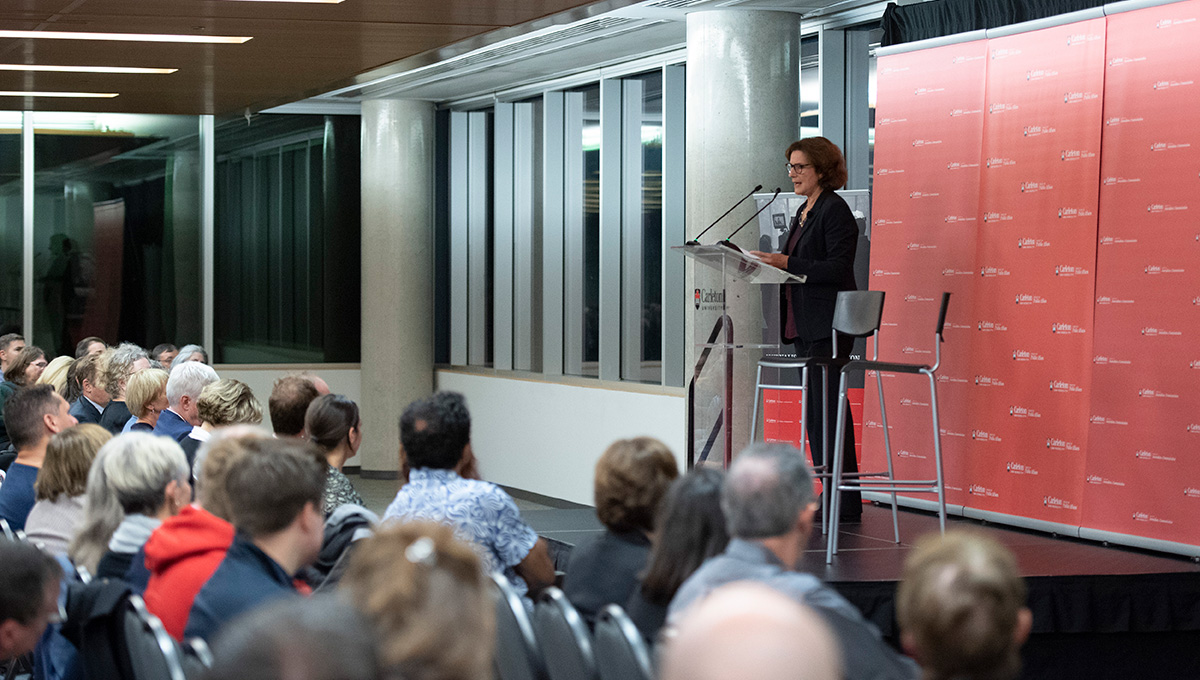
Carol Off Explores Two Opposing Sides of Journalism
Off compared two journalists who embodied the opposing sides of detachment and engagement in their work. She pointed to Sunday Times reporter Marie Colvin, a veteran journalist killed six years ago while covering the war in Syria. The American reporter had been hunted by Syrian forces as she documented the destruction of hospitals, houses and people. Colvin had felt a lasting commitment to the people who became her sources, and though she faced criticism and controversy, she regularly stayed in the conflict zones she covered to help those in need.
“They were her sources, but more importantly they were her motivation, her reason for being there,” said Off.
On the other hand, there is Los Angeles Times reporter Sonia Nazario’s and her massive exposé on children of drug addicts in 1997. Her documentation of the desperate children left nothing to the imagination; their squalid lives were detailed with brutal clarity.
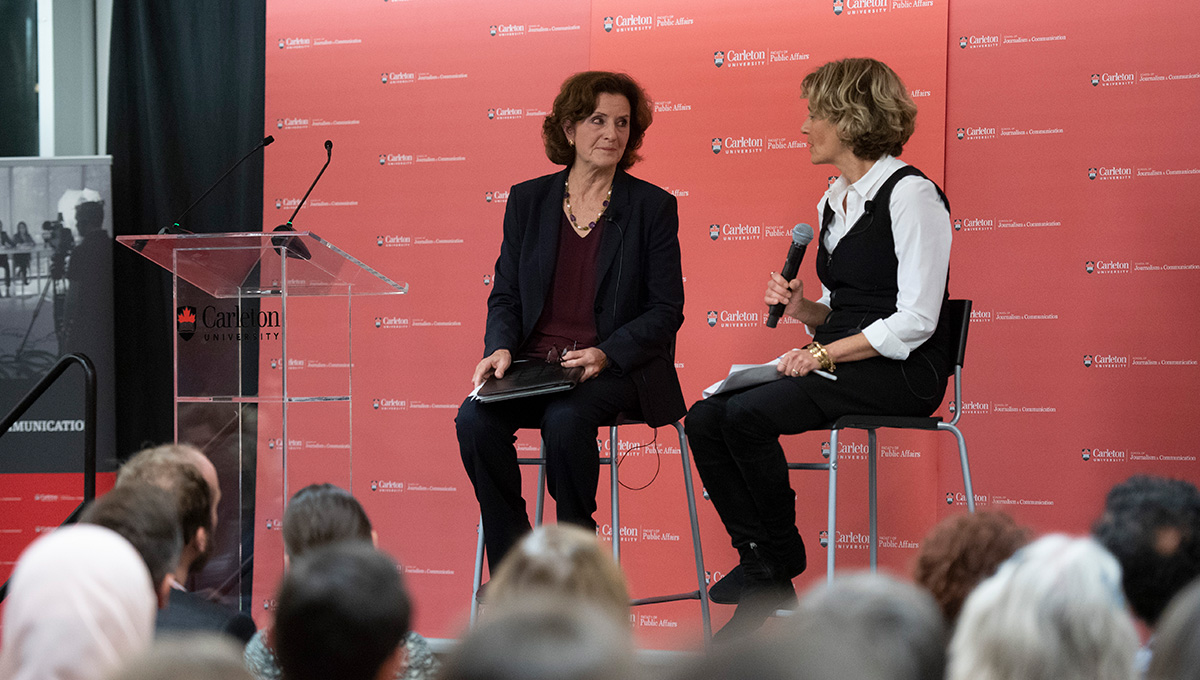
Carol Off speaks to Joyce Napier, Ottawa bureau chief for CTV National News.
Public outcry led to new policies and interventions into the children’s lives. But the outrage also focused on one featured photo: a father brushing his little girl’s teeth with the AIDS-infected mother’s toothbrush.
Nazario did not stop the father when this happened. She believed that to engage would help one person, but to record and report would to potentially help many.
During her formative years, Off was convinced that the best journalist was a fly on the wall. She had to be impartial, disinterested, and above all balanced and fair in her reporting.
But sources, by definition, become vulnerable. They are exposed to consequences, to mockery and sometimes to danger. While the CBC’s journalistic standards and practices handbook references impartiality and conflict of interest, it leaves the obligations to sources up to the reporter.
“We’re on our own, with our own moral compass for guidance,” she said.
“And if you think that’s easy, you are mistaken.”
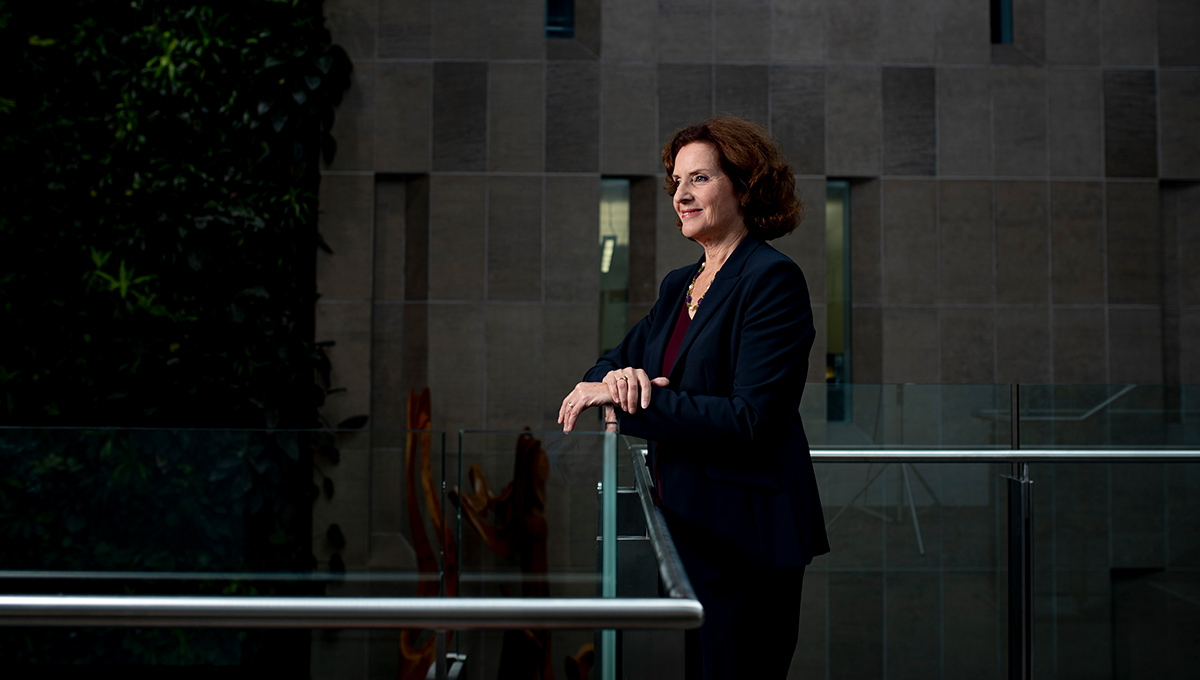
Thursday, September 27, 2018 in Faculty of Public and Global Affairs, Journalism and Communication
Share: Twitter, Facebook
